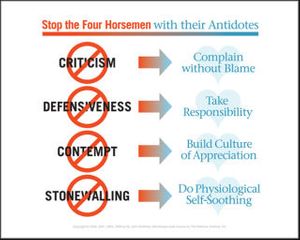Couples often have the same complaint. “When things are good, we’re great. But when we argue, we can never seem to fight fair. It becomes downright nasty and that just isn’t us.
Sound familiar to you?
Successful and loving couples do one thing differently to couples that are struggling. They don’t just keep their manners in check when they’re getting along; they know how to be polite to one another during times of conflict as well. This is a critical difference and one that has lasting effects.
Don’t feel doomed if you’re the couple who drudges up the past, quips back in anger and lashes out in hostility. If you know what to look out for, you’ll be on your way to having healthy conflict management in no time. Marriage researcher John Gottman calls the four most destructive relationship patterns the four horseman of the apocalypse
- Defensiveness– Have you ever tried to raise an issue with your partner calmly and delicately, only for them to angrily reply, “Well if YOU wouldn’t have made us late, I would have had time to [insert complaint here]?” I’m guessing this is a pretty common response. Defensiveness tends to show up in partners who act like the victim or martyr. It’s a way of taking the responsibility off of them and placing it back on their partner. This leads to more defensiveness, blame and counter-attack. Instead of becoming defensive, hear your partner out. Try to listen to the underlying emotion behind what your significant other is saying and take some responsibility for how you contributed to making them feel. Statements like, “I never thought about it that way,” or “I’m sorry you’re upset. I didn’t know my actions did that to you,” immediately de-escalates the situation and shows your partner that you have genuine concern for their feelings and want to make things better.
- Criticisim– Criticism generally starts off as “you always” or “you never” and gives the perception that your partner is somehow intrinsically flawed or has an unappealing character defect. Who would ever want to feel like their partner doesn’t like them as a person? Well that’s how criticism comes across. Instead of criticizing, air your grievances without blaming your partner. A different approach would be to say, “It hurts my feelings when you don’t let me finish my sentence. Can I please get some time to talk without being interrupted?” Just a quick word on constructive criticism; well there is no such thing. Even if it FEELS like it’s coming from a good place, it still sends the message “I know better than you do (puts you in a position of superiority) and I think you should change.” Women tend to criticize more than men.
- Contempt– Contempt is by far the most damaging of all and has the greatest predictor of relationship dissolution. Contempt can be tricky because it often has a quick and inconspicuous delivery. Eye rolling, sneering, mockery, insults, name calling, passive-aggressiveness, being condescending and making jokes about your partner for the sake of looking foolish or silly are all forms of contempt. Once you start finding your partner irritating or annoying, it’s time to start working on your friendship again. Creating what’s called “a culture of appreciation” for your relationship means that you actively look for ways to be grateful and appreciative of your partner and the relationship. Finding ways to connect and be genuinely interested in what your partner has to say will also release some of those contemptuous behaviors.
- Stonewalling is shutting down on your partner in order to protect yourself when feeling overly stimulated or flooded. Stonewalling can be leaving the room during a fight, tuning out, looking away or disengaging completely from the conversation. Most men stonewall more than women. Instead of stonewalling, take a break in order to self-soothe so that you can come back to the situation at hand in a more calm and rational manner.
I’m sure if you think back to your childhood you can recall one or both of your parents using the four horseman so it only makes sense that we would learn them early on and carry them with us. However, we don’t have to allow them to continue. Understanding what they are and knowing when they creep up in your relationship allows insight in being able to stop them in their tracks and offer a different to the sometimes-difficult conversations we have with our loved ones.







